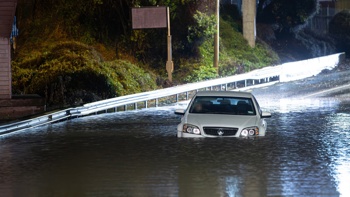The Department of Conservation [DoC] plans to ramp up search efforts for the pod of stranded orca calf Toa as a window of fine weather opens.
The calf was moved back into a sea pen near the Plimmerton boat ramp overnight after it was determined it would be in the best interest of the orca's health.
DoC marine species manager Ian Angus said Toa has reacted well to the change of environment.
"As soon as the calf was back in the sea, he started calling and zooming around the pen."
The juvenile orca aged between 3 and 6 months was found stranded on rocks at Plimmerton beach near Porirua on July 11.

Orca calf Toa swimming and diving strongly with volunteers in his sea pen at the Plimmerton Boating Club ramp in Porirua. (Photo / Mark Mitchell)
Search efforts that have taken place over the past 12 days to find the calf's pod have been so far unsuccessful, leaving him in the care of DoC, Whale Rescue and volunteers.
Angus said plans to increase the search efforts are currently being pulled together after fine weather is forecasted till Sunday.
"We remain focused on trying to find the orca calf's pod. Our efforts will be focused on the lower half of the North Island and upper half of the South Island.
"However, we are still calling for people to report any sightings from anywhere in the country, as New Zealand orca can travel up to 160km a day."
Toa had been kept in a 32,000-litre temporary pool since last Thursday due to a storm that hit the Wellington region threatened to put volunteers and the animal at risk.

Orca calf Toa is back in a sea pen today after he was moved from a temporary pool last night for his well-being. (Photo / Mark Mitchell)
The Plimmerton Boating Club site remains closed to the public to reduce stress for the orca calf.
Angus said all decisions are still being made based on the health and wellbeing of the calf, and DoC is planning thoroughly for a range of options.
Anyone who sights orca pods is urged to provide as much information as possible to DoC, via [email protected] or by calling 0800 DOC HOT.
Essential information includes location of the pod, direction of travel of the animals, and photographs or videos which clearly show the saddle/back markings of the animals and their dorsal fins.
Take your Radio, Podcasts and Music with you









